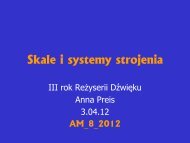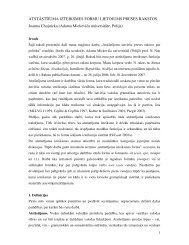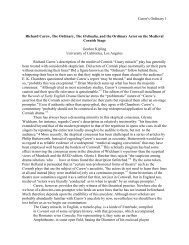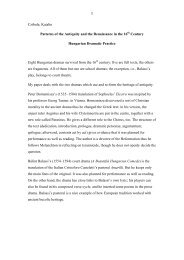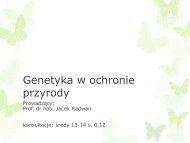Amir Weiner Getting to Know You
Amir Weiner Getting to Know You
Amir Weiner Getting to Know You
You also want an ePaper? Increase the reach of your titles
YUMPU automatically turns print PDFs into web optimized ePapers that Google loves.
36 AMIR WEINER AND AIGI RAHI-TAMM<br />
life of the surveillance system. The ideological bleeding triggered by the<br />
denunciation of the leader’s cult, the renunciation of mass terror, and<br />
the gradual opening <strong>to</strong> the outside world translated almost immediately<br />
in<strong>to</strong> new targets, new obstacles, and new methods of obtaining and using<br />
information. Relating the lessons of the era <strong>to</strong> its young apprentices, KGB<br />
direc<strong>to</strong>rs sounded almost nostalgic for an earlier, simpler age, when borders<br />
were controllable and the enemy recognizable and straightforward in its<br />
tactics and ideology. Although the new circumstances by no means implied<br />
“unnecessary liberalism and compromise with the criminal element,” as the<br />
Fourth Department of the Es<strong>to</strong>nian KGB emphasized in its 1956 annual<br />
report, they did underline the need for better documentation and greater<br />
care in formulating cases and, equally important, focusing only on hostile<br />
individuals and not their families. The era of collateral damage was over, at<br />
least formally. 99<br />
Closely associated with and reliant on the now-renounced mass terror,<br />
the importance of surveillance increased with the colossal effort <strong>to</strong> sustain the<br />
two remaining institutional pillars of the <strong>to</strong>talitarian system: an economic<br />
order based on a nonmarket, command economy and a political order based<br />
on single-party dicta<strong>to</strong>rship. 100 The reforms launched by Stalin’s successors<br />
created a world that was much more complex than the one they had<br />
hither<strong>to</strong> inhabited. Adjustment was turbulent, and the security organs were<br />
often caught asleep at the wheel and trapped in their own mythologies and<br />
institutional anxieties. When news on the workers’ uprising in East Berlin on<br />
17 June 1953 reached the western frontier, the surveillance reports recorded<br />
a u<strong>to</strong>pian harmony of a public that was unanimous in its condemnation of<br />
the “fascist hirelings bribed with American dollars who not only wished <strong>to</strong><br />
derail peaceful construction in the GDR [German Democratic Republic]<br />
but also came out against all those who want <strong>to</strong> <strong>to</strong>il peacefully,” <strong>to</strong> cite one<br />
of many identical reactions. 101 Given the fractured societies in the region<br />
and the deep-seated hostility <strong>to</strong> Soviet power that was often highlighted in<br />
reports until then, one could not avoid the impression that the turmoil and<br />
fear that engulfed the security organs throughout the last years of Stalin’s<br />
99 Chebrikov, Is<strong>to</strong>riia, 494–96, 511, 522–31, 544–45; ERAF SM f. 131, n. 347, s. 1, ll. 30,<br />
45, 55.<br />
100 KGB reports on the job performance of its various departments at the time underlined the<br />
importance of agentura and prophylaxis rather than punitive measures. See ERAF SM f. 131,<br />
n. 347, s. 1, ll. 30, 34, 41, 43, 47, 49.<br />
101 Rossiiskii gosudarstvennyi arkhiv noveishei is<strong>to</strong>rii (RGANI) f. 5, op. 30, d. 5, l. 95. For<br />
reports on the public reaction in other western Ukrainian regions, see TsDAHOU f. 1, op. 24,<br />
spr. 2998, ark. 11–15, 18–20; spr. 2737, ark. 63–64. For reactions recorded in Es<strong>to</strong>nia, see<br />
ERAF f. 1, n. 194, s. 1, ll. 1–3.



